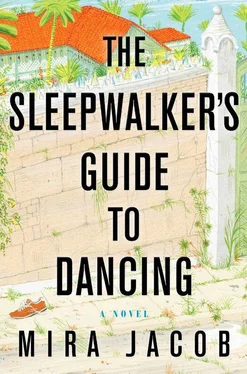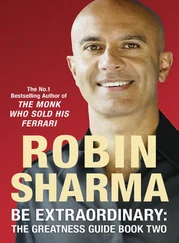“Because the fucking Internet assholes have found the place and raised the price of everything. What happened to Bali?”
“Something is wrong with my dad.” Amina took a short drag of the cigarette as concern darkened Dimple’s face. Of all the parents, it was Thomas — who had defended her worst high school escapades and protested strenuously against her eleventh-grade exile to reform school — whom Dimple loved best.
“What do you mean? Like, sick? How come my parents haven’t called?”
“No one knows yet.”
“It’s a secret?” Dimple’s eyes widened.
“Of course not.”
“What kind of sick?”
“There’s just some … I don’t know. He’s incoherent or something. My mother says he’s talking all night.”
“Talking?”
“Telling stories.”
Amina’s cousin rolled her eyes, her face slackening. “For the last hundred years, yes. What’s the fly-home emergency?”
“My mom thinks something is wrong.” Amina swiped a stripe of condensation off her pint. “Anyway, I just want to go check in.”
“What does your dad have to say about it?”
“My mom doesn’t want me talking to him about it over the phone.”
“So he hasn’t told you anything is wrong.”
“Yes, but that isn’t the—”
“And when did you last talk to him?”
“Last week.”
“And did he seem normal?”
Amina shrugged. “I mean, it’s my dad.”
Dimple squinted as she exhaled. “It’s a trap.”
“Oh, come on.”
“It’s a way for Kamala to get you back home. Where she can get you married.” She pointed at Amina with her cigarette. “Before your uterus dries up.”
“Oh, Dimple, stop. She hasn’t brought up anyone in over a year.”
“Proof!”
“No, this isn’t that.”
“Why not? Because the idea of your mother making some stupid plan without your permission is unthinkable?”
Amina took a sip of beer so she wouldn’t have to answer. Kamala had set her up with various Syrian Christian men (or, as she called them, “Potentials”) a total of twelve times. Eleven without Amina’s permission.
“Because she wouldn’t try the same bullshit over and over until it worked?”
Amina cleared her throat. “This isn’t that, I swear. And anyway, there aren’t even any good Suriani boys left, remember? She’s given up.”
“There were never any good Suriani boys. We’re a failed culture.” It was one of Dimple’s favorite theories, how thousands of years of obsession with a Christian God in a subcontinent of more dynamic religions had petrified the Syrian Christian community, turning them into what she alternately called “the stalest community on earth” or “India’s WASPs.” Amina braced for a full-on rant, but instead Dimple just blew a sharp plume of smoke from the corner of her mouth.
“I know what you’re saying,” Amina conceded. “But this is too low, even for my mother. She would never pretend that Dad was sick.” Dimple reached across the table to cup Amina’s jaw and leaned in so close that Amina could smell her familiar, flowery perfume over the smoke in the bar. “Fool,” she whispered, not unkindly.
Amina leaned back. The war over her soul and future had raged between Kamala and Dimple for too many years for her to take it personally. The bar was filling up, crammed with baggy pants, fleece jackets, messenger bags, and sneakers. Dimple scanned the room unhappily.
“Do you think it’s really going to last?” she asked. It was the question that came up every time the cousins went out lately, her tone alternating between sarcastic and despondent. No one had been more discouraged by the rise of the Internet than Dimple, whose complaints ranged from having her neighborhood gentrified to having the gallery she ran compromised by what she described in fundamentalist tones as “the corruption of the quality image in the digital age.”
Less vocal, if not actually less pessimistic, Amina was equally worried about the Internet, if only for the fact that it put her on the outside of something she feared might be generationally altering, like the civil rights movement or Woodstock. As “kids” just a few years younger than she flooded the city, scooping up armloads of vintage furniture and spreading through the neighborhoods on scooters, she clutched her trusty Leica, feeling like she was holding on to a wagon wheel in the face of the Industrial Revolution.
“I hate them,” Dimple said before Amina could respond. “I hate what they do, I hate that they make more money than I ever will. Did I tell you someone suggested that part of the gallery be ‘webcast’? What does that even mean?”
The cousins watched as a grinning guy in a baseball hat waved a twenty at the bartender.
“So how are things with Damon?” Amina asked.
“Over.”
“I thought it was going well.”
“He moved back in with his ex.”
“Are you serious?”
“It’s fine,” Dimple said with a shrug. “Honestly, it saved me the trouble of having to get involved.”
Five months older than Amina and therefore “well into age thirty,” Dimple had been quietly moving through Seattle’s supply of eligible men with a carnivorousness that occasionally scared Amina. It wasn’t the number of men her cousin saw that unnerved her (truth be told, Amina had probably slept with more men, more often) but rather the impatience with which Dimple went through them, bringing them to meet Amina at bars and tuning out when they spoke, frowning like she’d ordered the wrong thing from a menu.
While some might interpret this as indifference, Amina knew the opposite to be true. Never mind how many relationships Dimple opened or ended with a shrug; the one thing she really wanted — and had always wanted, even in high school, when she turned scaring boys away into a kind of performance art — was someone worth sticking around for. At this point, the only thing more humiliating than having another relationship fail would be for Amina to openly acknowledge it.
“How about you?” her cousin asked. “Have you managed to have a conversation with anyone you’re sleeping with?”
Amina took another sip of beer. “Why start now?”
An old Van Halen song pumped through the speakers, and half the guys at the bar threw up rocker fingers. The cousins sighed.
“Let’s go,” Amina said.
It was raining lightly as they left the bar, the soft, ceaseless, rhythmic kind of rain that is Seattle’s lullaby. They stood out on the wet street while Dimple shook three cigarettes out of the pack, pressing them into Amina’s hand.
“Thanks.”
“Oh God!” Dimple clapped her hand to her chest. “I almost forgot! I told Sajeev we’d go out with him Saturday night.”
Amina groaned.
“I had to, Ami. He’s called twice since he moved here, and we keep putting him off. My parents are driving me nuts with all the messages they’ve been leaving.” She switched into her mother’s husky Indo-British whisper, and pursed her face into a perfect Bala Auntie. “Dimple dahling, please do take the fine young man out. Mary Roy is calling all the time only. Everyone is wanting to know how he is.”
That their dislike of Sajeev Roy was hardly fair didn’t stop the cousins from dreading him. When they were in kindergarten, it was his vulnerability that marked him, his constant thrashing at the hands of American boys, his eagerness to be part of their tight huddle. The girls had been relieved when his family moved to Wyoming, although their own mothers’ all-too-vocal admiration for his later successes (MIT undergrad, a degree in engineering) still rendered him unappealing.
“Can’t you just go for both of us? I’m really going to be beat.”
Читать дальше












